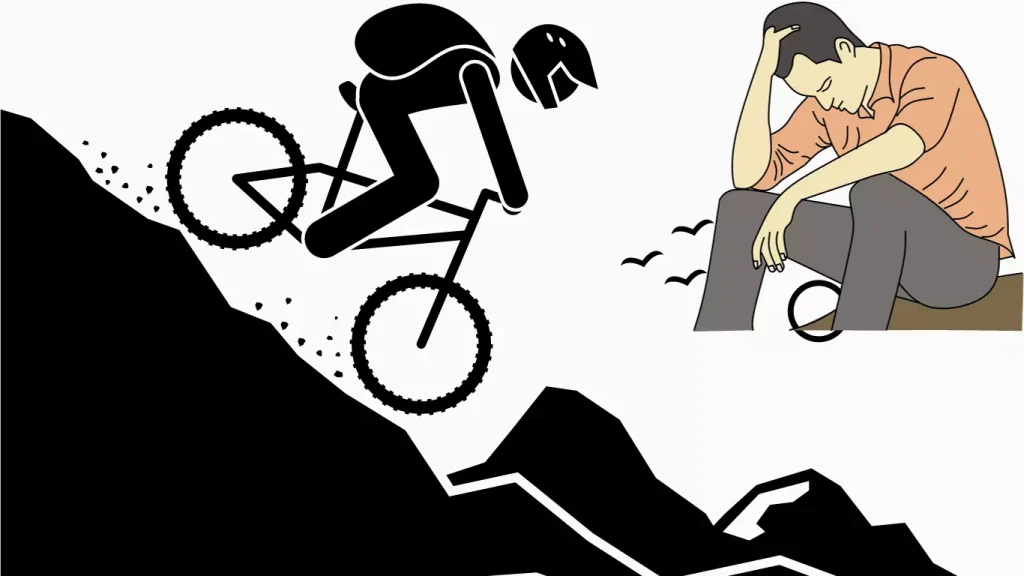“Advantages and Disadvantages of Mountain Biking” is a comprehensive topic that delves into the pros and cons of these versatile off-road bicycles. When exploring the world of mountain biking, understanding both the advantages and disadvantages is crucial to making an informed decision and ensuring that your choice aligns with your specific riding needs and preferences. Let’s delve into these aspects in detail.
Advantages of mountain biking
Mountain biking is packed with perks. It’s not just about the thrill; it’s an all-in-one adventure. You get to explore rough paths, improve your fitness, and enjoy many advantages. Let’s explore the advantages of mountain biking in simple terms.

Durability: Built to Brave
- Mountain bikes are engineered for resilience. Constructed with sturdiness in mind, they scoff at rough terrain and challenging landscapes. They’re your steadfast companion, taking on the roughest trails without a flinch.
- Whether it’s rocky inclines, root-strewn paths, or gnarly descents, a mountain bike’s robust build and reinforced frame ensure it can weather it all. This durability not only extends the lifespan of your trusty steed but also provides peace of mind, knowing it won’t give out when the going gets tough.
Versatility: A Bike for Every Path
- These aren’t just for trails. Mountain bikes are versatile creatures. They’re equally at ease on city streets, gravel paths, and moderately smooth roads. They’re your go-anywhere, do-anything companions for every adventure you undertake.
- This adaptability opens up a world of possibilities. Commuting to work, exploring hidden trails, or embarking on a weekend jaunt—a mountain bike is up for the challenge. Its multi-faceted nature means you’re not confined to one type of terrain, making it an excellent choice for riders seeking a diverse range of experiences.
Comfort: Tailored for You
- Comfort is key to an enjoyable ride. Mountain bikes are designed with your comfort in mind. You can tweak the seat, handlebars, and suspension to fit you like a glove. This means you’ll stay refreshed and ready for more, mile after mile.
- Say goodbye to the days of sore backs and aching joints. With adjustable components, you can fine-tune your bike to match your body’s unique proportions. This personalized approach minimizes discomfort and fatigue, allowing you to focus on the sheer joy of the ride.
Maneuverability: Dance Through the Trails
- Maneuvering through tight turns and tricky spots is a breeze with mountain bikes. They respond promptly to your commands, giving you the finesse to navigate through technical sections and curves with grace and confidence.
- Gone are the days of clunky, unresponsive rides. Mountain bikes are nimble and quick, allowing you to tackle challenging terrain with precision. Whether it’s threading through a forested trail or negotiating a series of switchbacks, you’ll revel in the bike’s agility and responsiveness.
Stability: Your Rock in the Rough
- Imagine standing on shifting sand versus solid ground. Mountain bikes are on solid ground. With wide tires and sturdy frames, they keep you steady on uneven paths. This not only amps up safety but also fuels your confidence to conquer even the most challenging trails.
- Unpredictable terrain is no match for a mountain bike’s stability. It acts as your anchor, providing a secure platform to navigate through rocky outcrops, root-riddled sections, and uneven ground. This steadfastness not only enhances your safety but also emboldens you to push your limits, knowing your bike has your back.
Great Traction: Grip, Grip, Grip
- Traction is the name of the game. Picture walking on ice without a slip. That’s top-notch traction. Mountain bike tires are purpose-built to grip the ground like a vice. Be it loose gravel, mucky paths, or rugged trails, you’ll stay in control.
- The key to conquering challenging terrain lies in traction, and mountain bike tires have it in spades. Their specialized treads and materials provide exceptional grip, allowing you to power through loose surfaces, maintain control on muddy trails, and confidently tackle rough, rocky paths. With this level of traction, you’ll feel unstoppable on any trail.
Can Handle Any Type of Terrain
- Mountain bikes are the Swiss Army knives of cycling. They’re designed to tackle a wide range of terrain with confidence and ease. Whether you’re navigating through rocky trails, splashing through muddy paths, or cruising along sandy shores, a mountain bike is your reliable companion. Its sturdy frame and specialized tires provide the stability and traction needed to conquer any landscape. So, whether you’re a thrill-seeker or a nature enthusiast, you can trust your mountain bike to handle any type of terrain you throw its way.
Good for Commuting
- While mountain bikes are synonymous with off-road adventures, they also excel in everyday commuting. Their versatility extends beyond the trails, making them a practical choice for city streets and suburban roads. With responsive handling and a robust build, navigating through traffic becomes a breeze. Plus, the comfortable design ensures you arrive at your destination feeling refreshed, even on longer journeys. Whether you’re heading to work, running errands, or exploring your neighborhood, a mountain bike is a reliable and efficient mode of transportation.
Easy on Your Joints
- Concerned about joint strain? Mountain biking offers a low-impact solution. The built-in suspension systems on these bikes work like shock absorbers, significantly reducing stress on your joints. This makes mountain biking an accessible option for individuals with joint sensitivities or conditions like arthritis. You can enjoy the invigorating experience of outdoor cycling without worrying about putting excessive strain on your body. It’s a gentle yet exhilarating way to stay active and connected with nature.
Accessibility for Bikes
- Mountain biking isn’t just a hobby; it’s a lifestyle. That’s why finding the perfect bike is crucial. Fortunately, the world of mountain biking offers a diverse range of options to suit different preferences and budgets. Whether you’re a beginner or a seasoned pro, there’s a bike that’s just right for you. Moreover, there’s a wealth of resources available, both online and in specialized stores, to help you make informed decisions about which bike best fits your needs. From test rides to expert advice, the accessibility of options ensures you find a bike that’s tailored to your unique style of riding.

Accessibility for Components
- Maintaining and personalizing your mountain bike is a breeze, thanks to the accessibility of components and accessories. Whether you’re looking to upgrade specific parts or perform routine maintenance, you’ll find a treasure trove of options at your disposal. From high-performance tires to advanced suspension systems, the market caters to a wide range of preferences. This accessibility empowers you to fine-tune your bike to your exact specifications, allowing you to get the most out of every ride. Whether you’re seeking speed, comfort, or precision, you have the tools to create a ride that’s uniquely yours.
Good Performance in All Weather Conditions
- When it comes to conquering the elements, mountain bikes stand tall. Their design is tailored to excel in various weather conditions. Whether it’s rain, snow, or sunshine, these bikes keep their composure. Specially crafted tires provide excellent grip, even on wet or slippery surfaces. The robust frame and components are built to withstand the challenges that different weather conditions throw at them. So, no matter what nature has in store, your mountain bike is ready to take it on.
Good for Workout
- Mountain biking isn’t just a fun pastime; it’s also an excellent way to stay fit. It offers a full-body workout that engages various muscle groups. Your legs power through pedaling, while your core and arms work to maintain balance and control. Navigating through uneven terrain provides an effective cardiovascular workout, boosting your endurance and stamina. Uphill climbs build strength, while downhill descents require focus and stability. This dynamic combination of cardiovascular and strength training makes mountain biking an exceptional way to stay in shape while enjoying the great outdoors.
Affordability
- Mountain biking offers an accessible entry point into the world of cycling. Compared to some specialized disciplines, like road racing or downhill biking, getting started with mountain biking is relatively budget-friendly. There’s a wide range of options available, catering to various price points. From entry-level models that offer excellent performance to high-end bikes with advanced features, you can find one that suits your budget and requirements. This affordability ensures that the joys of mountain biking are within reach for riders of all financial backgrounds.
Popularity
- Mountain biking has captured the hearts of riders worldwide and enjoys widespread popularity. It’s more than just a sport; it’s a thriving community of enthusiasts. From the scenic trails of North America to the challenging routes of Europe, mountain biking transcends borders and cultures. This popularity has led to the development of dedicated biking communities, events, and purpose-built trails. It’s a shared passion that fosters camaraderie and adventure among riders from all walks of life. Whether you’re a seasoned pro or just starting out, you’re part of a global community that celebrates the thrill of the ride.
Disadvantages of Mountain Biking
While mountain biking offers thrilling adventures, it’s important to know about the potential disadvantages of mountain biking. You’ll need specific skills, and it can be expensive to start. Keeping up with maintenance and riding on regular roads might be a bit harder. Moving mountain bikes around, especially the ones with full suspension, can also be tricky. Plus, we should be mindful of how riding affects nature. Remember, these points are just to help you be ready and make the most of your rides!

Price
- Investing in a high-quality mountain bike can be a substantial financial commitment. These bikes are engineered with specialized materials and components designed to withstand the rigors of off-road terrain. As a result, they often come with a higher price tag compared to standard bicycles. For those on a budget or individuals new to the sport, this initial cost may pose a significant consideration.
Price of Bike Maintenance
- Beyond the upfront investment, the maintenance of a mountain bike can also entail additional expenses. The unique components that make mountain bikes capable of handling rough trails, such as sophisticated suspension systems and specialized high-traction tires, may require more frequent attention and replacement. This can lead to higher maintenance costs over time compared to bikes designed for smoother surfaces. It’s crucial to factor in these ongoing expenses to ensure your mountain bike remains in peak condition.
Lower Pedaling Efficiency
- While mountain bikes thrive on challenging terrain, they may not offer the same level of efficiency for long-distance, on-road cycling. The robust construction and wider, knobby tires that provide stability and traction on rough trails can lead to slightly lower pedaling efficiency on smoother surfaces. This means you may need to exert more effort to cover the same distance compared to a sleeker, road-specific bike. It’s a trade-off for the versatility and durability that mountain bikes offer.
Specific Skill sets are required.
- Mastering the art of mountain biking can demand a specific set of skills. Navigating through technical trails, especially on steep descents or tight switchbacks, requires a combination of balance, agility, and precise control. This learning curve may be steeper for beginners, and it’s important to invest time in building and refining these skills to fully enjoy the sport safely.
Storage and Transportation Considerations
- Mountain bikes, particularly those with full suspension systems, can be bulkier and heavier compared to other types of bicycles. This may pose challenges when it comes to storage and transportation. You’ll need ample space for storage, and transporting them may require a bike rack or specialized equipment for your vehicle.
Heavier compared to Other Types of Bikes
- Mountain bikes are purpose-built for rugged terrain and durability, which means they tend to be heavier than other types of bicycles. This additional weight is a trade-off for the robust frame, reinforced components, and specialized suspension systems that allow them to tackle challenging trails with confidence. While the weight provides stability and reliability on rough terrain, it may be a consideration for riders who need to carry their bikes up stairs, load them onto vehicles, or have a preference for lighter, more nimble rides.
Tires Wear More Quickly on Pavement
- The design of mountain bike tires, with their deep treads and specialized rubber compounds, is optimized for superior traction on rough and uneven surfaces. However, this design characteristic can lead to faster tire wear when used extensively on pavement. The softer rubber compounds and aggressive tread patterns that enhance off-road performance may wear down more quickly on smoother surfaces. This means that if a significant portion of your riding involves pavement or roads, you may find yourself replacing tires more frequently to maintain optimal performance.
Slower on The Road
- Mountain bikes, with their sturdier construction and wider, knobby tires, are inherently designed for off-road adventures. As a result, they tend to be slower on smooth, flat surfaces compared to specialized road bicycles. The increased rolling resistance from the tread pattern and the additional weight can lead to a slightly slower pace. If covering long distances on roads at higher speeds is a primary objective, a road-specific bike may provide a more efficient and streamlined option. However, it’s important to note that mountain bikes excel in off-road environments where speed may not be the primary focus.
Limited Gear Range for Speed
- Mountain bikes are equipped with a gear range that is optimized for off-road use, with a focus on providing the necessary range for climbing steep inclines and navigating technical descents. This can result in a more limited top-end speed on flat surfaces compared to road bikes, which often have a wider gear range for achieving higher speeds. If achieving high-speed performance on roads is a central goal, a road-specific bike with a broader gear range may be a more suitable choice. However, it’s crucial to consider that mountain bikes are designed for a different set of challenges and excel in environments where speed is not the primary objective.
5 Unique Advantages of Mountain Biking
Mountain biking isn’t just a sport; it’s a dynamic and multi-faceted activity that offers a range of distinctive benefits. Here are five less-explored advantages of mountain biking that might surprise you:

1. Environmental Awareness and Conservation:
- When you’re out on the trails, you develop a heightened sense of environmental awareness. You become attuned to the natural rhythms and delicate ecosystems of the wilderness. This connection fosters a deeper appreciation for conservation efforts and a desire to protect the very landscapes you explore. Many mountain biking communities actively engage in trail maintenance and conservation initiatives, contributing to the preservation of natural spaces.
2. Problem Solving and Tactical Thinking:
- Mountain biking demands a unique form of problem-solving. Navigating technical terrain requires strategic thinking, quick decision-making, and precise execution. It’s akin to solving a dynamic puzzle, where every twist and turn presents a new challenge to overcome. This mental engagement adds an extra layer of satisfaction to each ride as you strategize your way through obstacles and conquer the trails.
3. Empowerment and Overcoming Fears:
- Conquering challenging trails instills a profound sense of empowerment. Every steep incline you climb and technical section you navigate is a testament to your strength and determination. It’s a tangible reminder that you’re capable of overcoming obstacles, both on and off the trail. The confidence gained from mountain biking often translates into increased self-assurance in various aspects of life.
4. Time Management and Goal Setting:
- Planning and executing mountain biking adventures require effective time management and goal-setting skills. From scheduling rides to preparing the necessary gear, you learn to prioritize and allocate your time efficiently. Setting personal riding goals, whether it’s conquering a particularly tough trail or achieving a specific distance, provides a tangible sense of accomplishment and motivates further progress.
5. Enhanced Spatial Awareness and Reflexes:
- Mountain biking sharpens your spatial awareness and reflexes in a dynamic outdoor setting. Negotiating through narrow trails, avoiding obstacles, and making split-second decisions improve your ability to judge distances and react swiftly. These enhanced spatial skills not only benefit your riding but can also carry over into everyday situations, such as driving or navigating crowded spaces.
“Social Spokes: Building Bonds on Biking Trails”
Improving The Health of Your Heart
- Mountain biking is your heart’s best friend. It’s not just an exhilarating outdoor adventure; it’s a cardiovascular workout that gets your heart pumping and your entire circulatory system engaged. When you’re tackling trails and powering up inclines, your heart works harder to deliver oxygen to your muscles. Over time, this regular cardiovascular exercise strengthens your heart muscles, enhances circulation, and contributes to overall cardiovascular health. Your heart becomes a lean, mean, endurance machine, reducing the risk of heart disease and keeping your cardiovascular system in tip-top shape.
Increase Brain Power
- Mountain biking is a mental gym for your brain. It’s not just about the physical exertion; it’s a dynamic cognitive workout as well. Navigating through challenging terrain demands focus, quick decision-making, and acute spatial awareness. You’re like a puzzle solver on two wheels, calculating every turn, obstacle, and twist. The exhilaration of the ride, combined with the stimulating outdoor environment, enhances cognitive function. Engaging in mountain biking sessions has been linked to improved memory, increased mental clarity, and boosted brainpower. It’s not just about strengthening your body; it’s about fortifying your mind.
Best Form of Exercise
- Mountain biking isn’t your average workout; it’s the complete package. It’s not limited to one muscle group or a specific fitness aspect. It’s the ultimate full-body exercise regimen. With every pedal stroke, you’re building lower body strength, while navigating challenging terrain hones your upper body control. The cardiovascular component of mountain biking enhances endurance, stamina, and overall fitness. It’s not like those specialized workouts that target just one part of your body; it’s a holistic, all-inclusive exercise that ensures you’re in the best shape possible.
Best for Mental Health
- Mountain biking isn’t just about physical health; it’s a powerful tonic for your mental well-being. The combination of physical exertion and immersion in the natural environment has a profound positive impact on your mental health. As you hit the trails, your body releases endorphins, those wonderful ‘feel-good’ hormones that reduce stress, anxiety, and depression. Additionally, the meditative quality of riding in nature, fully focused on the trail, brings a sense of calm and mental rejuvenation. It’s a journey for your body and a retreat for your mind.
Social Benefits
- Mountain biking isn’t just an individual pursuit; it’s an opportunity to join a vibrant community. Whether you’re riding with friends, participating in group rides, or attending biking events, you’re connecting with a network of like-minded individuals who share your passion for adventure and the outdoors. It’s not just a sport; it’s a social gathering, a camaraderie that builds through shared experiences on the trails.
- Your fellow riders become more than friends; they become a community, a supportive network of adventure seekers and trail conquerors.
Improved fitness, mental well-being, and a deeper connection with nature.
What skills do beginners need for mountain biking?
Balance, agility, and precise control are crucial.
How can riders minimize their impact on the environment?
Stick to designated trails, join trail maintenance efforts, and support conservation.
Why is community important in mountain biking?
It fosters camaraderie, support, and lasting bonds among riders.
What challenges should mountain bikers prepare for?
Technical skill development, initial investment, maintenance costs, and considerations for road efficiency, storage, and transportation.

